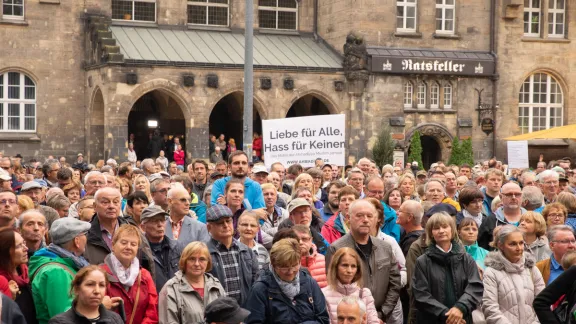
Participants of the demonstration against hate and violence in Chemnitz, Germany. Photo: EVLKS/W.A. Müller-Wähner
Lutheran church in Saxony opposes violence and populism
(LWI) “It takes courage to counter the message of hate and mercilessness with a message of reconciliation, every time,” Rev. Dr Carsten Rentzing, the bishop of the Evangelical Lutheran Church of Saxony (ELCS), Germany, says. The member church of the Lutheran World Federation organized a demonstration against hate and violence in the German city of Chemnitz on 2 September, after a week of violent outbreaks and demonstrations against foreigners.
With its demonstration, ELCS joined an initiative organized by the city of Chemnitz, ecumenical and interfaith partners, local associations and civil society. The violent outbreaks in Chemnitz happened after a 35-year-old German was stabbed at the city festival celebrating the 875th anniversary of Chemnitz. The suspects, an Iraqi and a Syrian, are in police custody.
Taking advantage of a violent death
Hours after the event, even before police revealed the nationality of the suspects, right wing extremists took over the narrative on social media. Demonstrations against foreigners were organized, some of which turned violent. Video footage shows foreigners being chased through the streets. German chancellor, Angela Merkel, as well as government officials and civil society actors, strongly condemned the violence.
About 1000 people followed the call of ELCS under the theme “Us in Chemnitz - listen to each other, act together”, which promotes non-violence, respect, dialogue and democracy. ELCS condemned the radical demonstrators who used the attack to further their cause. “As a church, we are concerned when radical, violent groups in our society question the state monopoly on legitimate force,” a church statement said. The church emphasized that it was the sole duty of the authorities to investigate the incident and to deal out a just punishment to the perpetrators.
Preserve decency and dignity
The protests follow a narrative perpetrated by the ring-wing party Alternative für Deutschland (Alternative for Germany) and the PEGIDA movement (Patriotic Europeans against the Islamization of Western Europe), following the refugee crisis in 2015, claiming that Muslim immigrants are molesting German women and girls.
Rentzing asked people to stay confident, despite the events of the previous week. He said it took courage to preserve decency and dignity, even if the heart was filled with anger about senseless violence.
Prior to the fatal stabbing, ELCS celebrated an ecumenical service in the St. Peter city church. Bishop Rentzing and his Catholic counterpart Heinrich Timmerevers, Bishop of the Diocese Dresden-Meissen, preached on the Bible verse “And be working for the peace of the city, and make prayer to the Lord for it” (Jeremiah 29:7), underlining the fruitful influence of Christians in the city. Like most of Saxony, Christians are a minority in a predominantly atheist society.
In the past years, Germany has witnessed an increase in right-wing populist movements. Since 2014, the xenophobic and anti-islam organization PEGIDA has been organizing weekly demonstrations. Challenges related to the refugee crisis and the arrival of about one million refugees and migrants to Germany in 2015 and 2016 created public debate about asylum and refugee policy in the European Union and Germany in particular.
In the federal elections 2017, the right-wing party Alternative for Germany attained an average 12 percent of votes. Saxony is considered a stronghold of the party, which won 25 percent of votes and is now the second largest party in the parliament. Churches and civil society have repeatedly advocated against violence and hate, and support many initiatives helping refugees and those seeking protection to integrate and legally pursue their claims.


